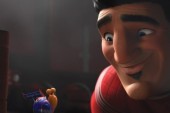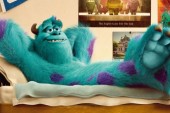
Brave, the new Pixar film about a Scottish princess named Merida determined to chart her own path in life, topped the North American box office–to the relief of some in Hollywood. According to Deadline Hollywood, there was fear from some in the film industry that Brave, with its female lead, might flop. If the concern sounds like deja vu, it’s because something similar happened with Tangled, Disney’s take on the story of Rapunzel, before it opened to $49M on its way to a total domestic gross of $200M.
Pixar films have elicited worries before, such as the stretches without dialogue in Wall-E and the sophisticated subject matter of Up, but the last Pixar film to worry money folks over a possibly unrelatable lead character was the culinary-themed Ratatouille, which featured a rat that could cook. Yes, if Brave had opened to $47M (as Ratatouille did), instead of $67M, there would be stories–Tangled notwithstanding–linking the commercial viability of female leads to that of rats.
Hollywood likes simple narratives, which is why it subscribes to the theory that women don’t attend films often. And when they do, the train of thought goes that a woman might accompany her boyfriend to a film aimed at men, but men would be too scared off in the reverse situation. It’s why we have endless sequels about alien robots. Sure, women attend and some like these films, but they weren’t made with women in mind–their presence is just gravy.
It’s also why a slew of articles always pop up about the astonishment of Tinsel Town when a film like Devil Wears Prada or Bridesmaids takes off. The films are either seen as exceptions to the rule or having compromised somehow to appeal to men.
What is never considered is that perhaps quality matters. Prada scored 76% on Rotten Tomatoes, an aggregator of critics’ reviews, and Bridesmaids, a whopping 90%. By comparison, schlock like What’s Your Number, which was framed as the potential indicator to a trend of popular female-driven gross-out comedies, flopped commercially and critically, with a rating of 24%. The lesson learned after Number tanked wasn’t that women (and men, frankly) tend to avoid terrible films–hello, Battleship (33%), That’s My Boy (22%), and Rock Of Ages (44%)–but rather that Bridesmaids was a fluke.
Of course, there’s no firm causation between critical appeal and box office grosses, but, with audiences having more forms of entertainment, quality is becoming a better indicator. (It’s probably not coincidental that the Avengers, with a score of 93%, sits at nearly $600M in domestic gross.)
What’s also not considered is that perhaps women are responding to the signal from most Hollywood studios that their films are not for them.
This signal can be overt, as an example, take comic Adam Carrolla being the latest to bring out the tired trope that women aren’t funny, so why make comedies that might also appeal to women? (The perfect response comes from Tina Fey, who wrote on the subject in her book Bossypants: “My hat goes off to them. It is an impressively arrogant move to conclude that because you don’t like something, it is empirically not good. I don’t like Chinese food, but I don’t write articles trying to prove it doesn’t exist.”)
The signal can also be subtler, such as films where there are barely any women in the cast, or, if there are, they appear as some combination of love interests; providers of exposition; emotional messes; or incapable, but redeemable messes. (For reference: see almost every Christopher Nolan film.) Mindy Kaling was dead-on when she listed specimens of women in films that don’t exist in real-life.
With women allegedly not showing up to films, it begs the question: where are all these women then? One potential answer: watching television. Blanche. Roseanne. Daria. Carrie. Peggy. All these names are instantly recognizable from their respective programs, not surprising given that television has always been a stronger home for gender diversity. That remains true today: Girls, Mad Men, Parks & Recreation, Cougar Town, and even the terrible 2 Broke Girls are among the shows with lead female protagonists filling the gap left by film.
Even more interestingly, for many of these shows, the audience isn’t just women. Sure, there was a debate (or at least media presented one) over whether guys could tune into the buzzy HBO series Girls, but just as men–yes, even heterosexual ones–found a way to its spiritual predecessor Sex and the City, I’m sure they will too for Girls. What’s been great about the show has been its refreshing point-of-view, one that surely in part stems from creator Lena Dunham being a woman, but more so that it comes from Dunham period.
The dizzying thing will be when Girls clones start popping up, created by any artsy female producers will be able to find. On one hand, it’ll be lovely that doors will open for more gender diversity, but, on the other, it’s so utterly reductive to think that what makes Girls work is that Dunham has a vagina.
In the same way, Brave didn’t open solidly because it had a female lead; instead, it depended largely on Pixar’s reputation and a few well-crafted teasers. At the same time, gender can’t be completely taken out of the equation: by having Merida be female, the writers could examine gender conventions, by playing against how a princess is expected to act. It was a concept Pixar films hadn’t explored yet, and evidently filmgoers were also brave enough to venture into new territory.
________
Jaime Woo is a Toronto writer, storyteller, and Gamercamp co-creator. Follow him on Twitter at @jaimewoo.
For more, follow us on Twitter: @torontostandard, and subscribe to our Newsletter.














